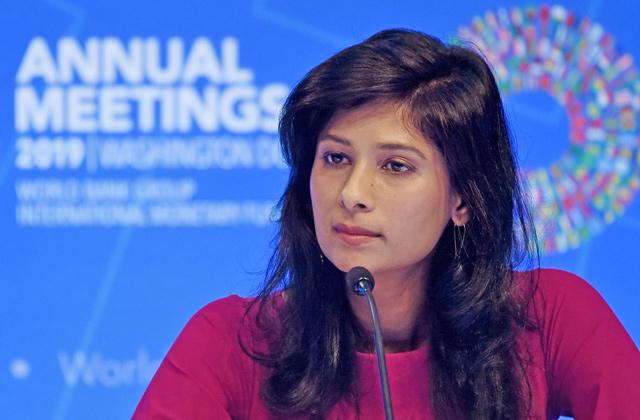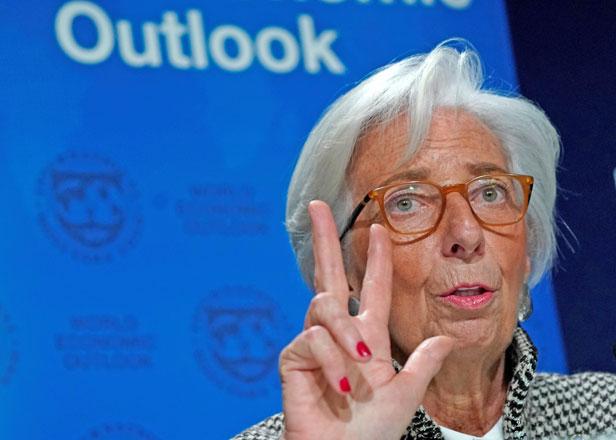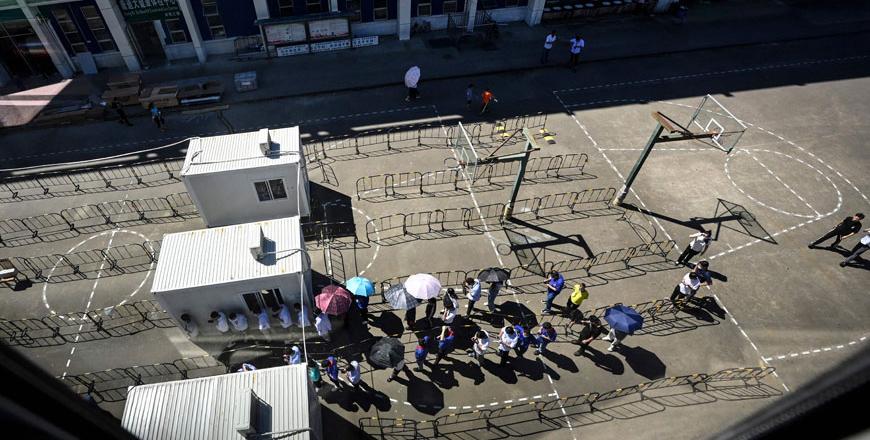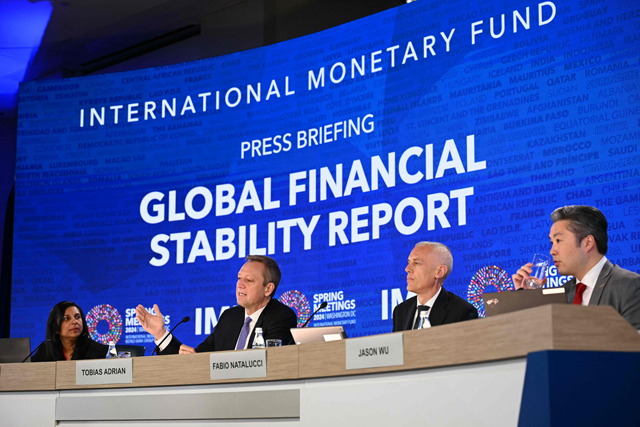You are here
IMF warns global outlook ‘precarious’, no room for policy mistakes
By AFP - Oct 15,2019 - Last updated at Oct 15,2019

Gita Gopinath, IMF chief economist and director of the research department, speaks at a briefing during the IMF and World Bank Fall Meetings, on Tuesday, in Washington, DC (AFP photo)
WASHINGTON — The world economy is slowing to its weakest pace since the global financial crisis, as the US-China trade war undercuts business confidence and investment, the International Monetary Fund said on Tuesday.
It warned that the outlook is beset by risks, and urged policymakers to work to find resolutions to trade disputes, since there are limited tools to respond to a new crisis.
"With a synchronised slowdown and uncertain recovery, the global outlook remains precarious," International Monetary Fund (IMF) chief economist Gita Gopinath said in her introduction to the latest forecasts.
The IMF for the past year has every three months cut projected growth for 2019 as trade conflicts worsened.
In its latest World Economic Outlook (WEO) it trimmed the estimate by another two-tenths, to 3 per cent. The report also lowered the 2020 forecast by a tenth to 3.4 per cent.
"At 3 per cent growth, there is no room for policy mistakes and an urgent need for policymakers to cooperatively deescalate trade and geopolitical tensions," Gopinath said.
In addition, the trade conflicts and a slowdown in auto sales worldwide means trade growth has slowed sharply, falling in the first half of the year to its weakest since 2012, with an estimated increase of just 1.1 per cent this year after a 3.6 per cent jump in 2018.
Running low on ammo
While the US economy also has been hit by uncertainty — largely created by President Donald Trump's trade offensive — the world's largest economy remains a bright spot on the global stage, the report said.
After upgrading its US outlook in July, the latest WEO reversed course, and cutting the US forecast this year to 2.4 per cent — still above trend, but two-tenths below the July forecast.
In 2020, the IMF projects US GDP to expand by 2.1 per cent, unchanged from the prior report.
"For the United States, trade related uncertainty has had negative effects on investment, but employment and consumption continue to be robust, buoyed also by policy stimulus," Gopinath said.
Major central banks have taken steps to soften the blow to growth by lowering interest rates, without which the downturn would have been worse, she said.
However, she cautioned that monetary policy "cannot be the only game in town" and governments, notably in countries like Germany, should take advantage of low rates to make investments to support growth.
"With central banks having to spend limited ammunition to offset policy mistakes, they may have little left when the economy is in a tougher spot," Gopinath warned.
The US-China trade war alone is estimated to shrink the world economy by 0.8 per cent in 2020, the IMF said.
The fund warned that risks to the outlook predominate, and the uncertainty around trade policy — which causes businesses to hold off on investments and undermines confidence — will take a larger chunk out of growth than the tariffs themselves.
Slowing auto sales
"To forestall such an outcome, policies should decisively aim at defusing trade tensions, reinvigorating multilateral cooperation, and providing timely support to economic activity where needed," the report said.
But trade is not the only reason for the global slowdown: The report notes that in China's economy, for example, growth is moderating as intended amid slowing domestic demand.
Other major economies like Brazil, India, Mexico, Russia and South Africa are slowing this year due to "idiosyncratic reasons" but are expected to recover in 2020.
"A notable feature of the sluggish growth in 2019 is the sharp and geographically broad-based slowdown in manufacturing and global trade," the IMF said, which in addition to the higher tariffs and trade uncertainty is the result of the contracting auto industry.
That slowdown has had an impact in Germany, China and India, the report said.
Related Articles
WASHINGTON — Global economies are recovering simultaneously and at a stronger than expected pace, and will get at least a short-term bo
WASHINGTON — Surging inflation and severe slowdowns in the United States and China prompted the International Monetary Fund (IMF) to downgra
WASHINGTON — The International Monetary Fund (IMF) has raised its outlook for the global economy this year, while maintaining a gloomy forec


















